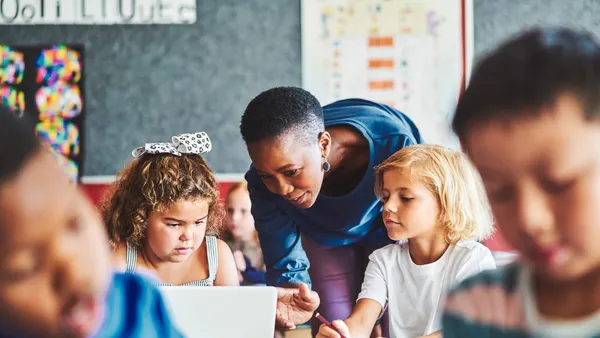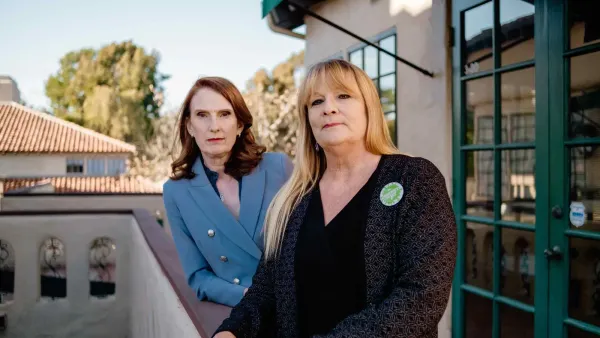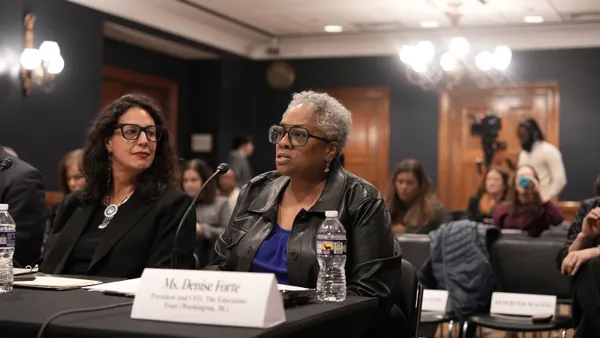Taxpayer-supported private school choice programs can empower families to enroll their children in the school best suited to them and benefit nearby traditional public school programs by driving competition and innovation, said supporters at a hearing on Capitol Hill Tuesday.
Opponents, however, argued that using public funds to pay private school tuitions are draining public schools of much-needed resources and excludes students with complex educational, emotional and physical needs.
In the first hearing before the House Subcommittee on Early Childhood, Elementary and Secondary Education of the 118th Congress, panelists gave diverse opinions about the merits and faults of private school choice. The conversation ranged from what state constitutional clauses say about public education to protections against discrimination of students in schools.
The two-hour hearing reflected strong sentiments nationally about whether choice programs will erode — or improve — the public education system, as well as who benefits and who doesn't.
"Parents, especially lower-income parents, need the power to be able to leave government-assigned schools that aren't working for their child."

Luke Messer
Former member of Congress and current president of Invest in Education Foundation
As an elementary student attending a neighborhood public school in a low-income neighborhood in Florida, panelist Denisha Allen said she had failed 3rd grade twice because she couldn't read and "hated" school. After receiving a tax-credit scholarship to attend a private church school, she caught up academically and became the first in her family to graduate high school, said Allen, a senior fellow at the American Federation for Children, a pro-school choice organization.
That school choice opportunity changed her life's trajectory, Allen said.
"We do have a system of choice in this country … and it's based on ZIP code," Allen said. "If you can afford to buy a house in a wealthy community, you have school choice, but unfortunately parents don't have that opportunity. Lower-income parents, even lower-middle-class parents, don't have the opportunity to pay for a house in a great district."
Giving parents the option to move their children out of failing schools is a main motivator for expanding school choice options, said supporters.
"I agree along with many of the other members at the thought that we have disabled our young people by not giving them the proper education, and definitely parents should have the power to make the educational decisions which are best for their children, including moving them out of failing schools and into schools where they can succeed," said Rep. Mary Miller, R-Ill.
Demand for school choice has grown over the past few decades, spurring the expansion of both public and private school options, several hearing attendees said. According to a recent analysis by FutureEd at the Georgetown University McCourt School of Public Policy, at least 32 states provide access to private school tuition through tax-funded school choice programs.
"Once a student enters voucher programs, they are left without most or even all of the civil rights protections and academic achievement standards that public schools are required to provide."

Rep. Suzanne Bonamici
A Democratic member of Congress representing the 1st Congressional District in Oregon
But not all students get accepted to selective private schools, and private schools do not have to offer certain special education and English learner services or discrimination protections for LGBTQ students, said opponents.
"Once a student enters voucher programs, they are left without most or even all of the civil rights protections and academic achievement standards that public schools are required to provide," said Rep. Suzanne Bonamici, D-Ore.
Additionally, Bonamici said, allocating taxpayer money to private school choice options means less funding for the public schools where most students are educated.
Panelist Derek Black, a professor of law and director of the Constitutional Law Center at the University of South Carolina, said states' obligations to provide a public education system — including reserving certain resources for public schools — take precedence over offering private school choice options.
"The purpose of those restrictions is to ensure states remain wedded to public education as their top priority and the public funds do not get diverted elsewhere to the detriment of public schools," Black said.
Rep. Jamaal Bowman, D- N.Y., called support of private school choice a "direct attack on the public school institution and infrastructure."
But private school choice supporters said it's the public's obligation to provide every student with a great education.
"The truth is we're a long way away from having a 21st century K-12 education model where every student has access to a great education and schools are laser-focused on learning and improving academic outcomes for students," said Luke Messer, a former member of Congress and current president of Invest in Education Foundation, a nonprofit school choice research and policy organization. Messer spoke as a panelist during the hearing.
"Parents need the freedom to choose the education environment that best meets their child's needs. Parents, especially lower-income parents, need the power to be able to leave government-assigned schools that aren't working for their child.”











